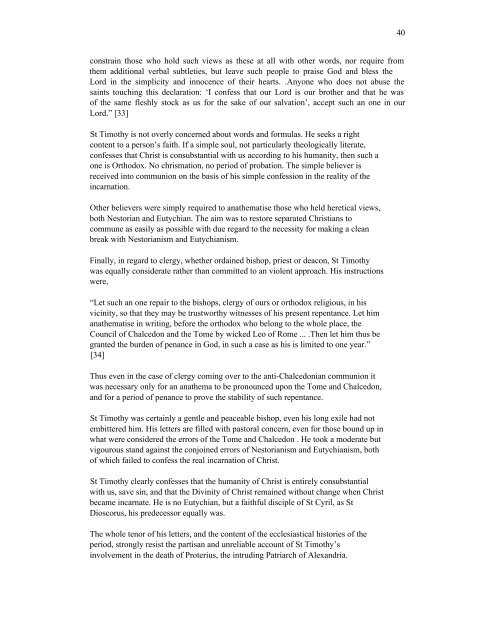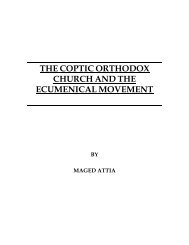Coptic interpretations of the Fourth Ecumenical Council - Saint Mina ...
Coptic interpretations of the Fourth Ecumenical Council - Saint Mina ...
Coptic interpretations of the Fourth Ecumenical Council - Saint Mina ...
Create successful ePaper yourself
Turn your PDF publications into a flip-book with our unique Google optimized e-Paper software.
constrain those who hold such views as <strong>the</strong>se at all with o<strong>the</strong>r words, nor require from<br />
<strong>the</strong>m additional verbal subtleties, but leave such people to praise God and bless <strong>the</strong><br />
Lord in <strong>the</strong> simplicity and innocence <strong>of</strong> <strong>the</strong>ir hearts. .Anyone who does not abuse <strong>the</strong><br />
saints touching this declaration: ‘I confess that our Lord is our bro<strong>the</strong>r and that he was<br />
<strong>of</strong> <strong>the</strong> same fleshly stock as us for <strong>the</strong> sake <strong>of</strong> our salvation’, accept such an one in our<br />
Lord.” [33]<br />
St Timothy is not overly concerned about words and formulas. He seeks a right<br />
content to a person’s faith. If a simple soul, not particularly <strong>the</strong>ologically literate,<br />
confesses that Christ is consubstantial with us according to his humanity, <strong>the</strong>n such a<br />
one is Orthodox. No chrismation, no period <strong>of</strong> probation. The simple believer is<br />
received into communion on <strong>the</strong> basis <strong>of</strong> his simple confession in <strong>the</strong> reality <strong>of</strong> <strong>the</strong><br />
incarnation.<br />
O<strong>the</strong>r believers were simply required to ana<strong>the</strong>matise those who held heretical views,<br />
both Nestorian and Eutychian. The aim was to restore separated Christians to<br />
commune as easily as possible with due regard to <strong>the</strong> necessity for making a clean<br />
break with Nestorianism and Eutychianism.<br />
Finally, in regard to clergy, whe<strong>the</strong>r ordained bishop, priest or deacon, St Timothy<br />
was equally considerate ra<strong>the</strong>r than committed to an violent approach. His instructions<br />
were,<br />
“Let such an one repair to <strong>the</strong> bishops, clergy <strong>of</strong> ours or orthodox religious, in his<br />
vicinity, so that <strong>the</strong>y may be trustworthy witnesses <strong>of</strong> his present repentance. Let him<br />
ana<strong>the</strong>matise in writing, before <strong>the</strong> orthodox who belong to <strong>the</strong> whole place, <strong>the</strong><br />
<strong>Council</strong> <strong>of</strong> Chalcedon and <strong>the</strong> Tome by wicked Leo <strong>of</strong> Rome ... .Then let him thus be<br />
granted <strong>the</strong> burden <strong>of</strong> penance in God, in such a case as his is limited to one year.”<br />
[34]<br />
Thus even in <strong>the</strong> case <strong>of</strong> clergy coming over to <strong>the</strong> anti-Chalcedonian communion it<br />
was necessary only for an ana<strong>the</strong>ma to be pronounced upon <strong>the</strong> Tome and Chalcedon,<br />
and for a period <strong>of</strong> penance to prove <strong>the</strong> stability <strong>of</strong> such repentance.<br />
St Timothy was certainly a gentle and peaceable bishop, even his long exile had not<br />
embittered him. His letters are filled with pastoral concern, even for those bound up in<br />
what were considered <strong>the</strong> errors <strong>of</strong> <strong>the</strong> Tome and Chalcedon . He took a moderate but<br />
vigourous stand against <strong>the</strong> conjoined errors <strong>of</strong> Nestorianism and Eutychianism, both<br />
<strong>of</strong> which failed to confess <strong>the</strong> real incarnation <strong>of</strong> Christ.<br />
St Timothy clearly confesses that <strong>the</strong> humanity <strong>of</strong> Christ is entirely consubstantial<br />
with us, save sin, and that <strong>the</strong> Divinity <strong>of</strong> Christ remained without change when Christ<br />
became incarnate. He is no Eutychian, but a faithful disciple <strong>of</strong> St Cyril, as St<br />
Dioscorus, his predecessor equally was.<br />
The whole tenor <strong>of</strong> his letters, and <strong>the</strong> content <strong>of</strong> <strong>the</strong> ecclesiastical histories <strong>of</strong> <strong>the</strong><br />
period, strongly resist <strong>the</strong> partisan and unreliable account <strong>of</strong> St Timothy’s<br />
involvement in <strong>the</strong> death <strong>of</strong> Proterius, <strong>the</strong> intruding Patriarch <strong>of</strong> Alexandria.<br />
40








